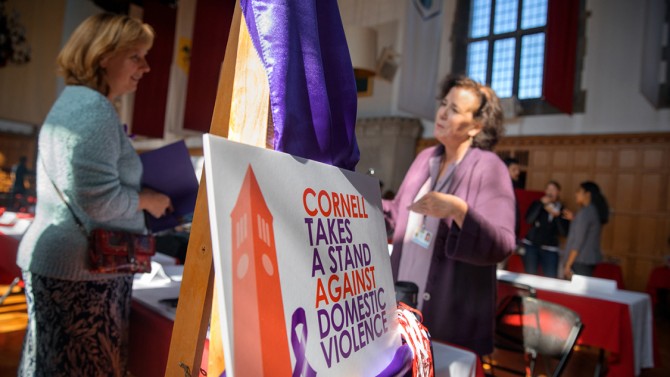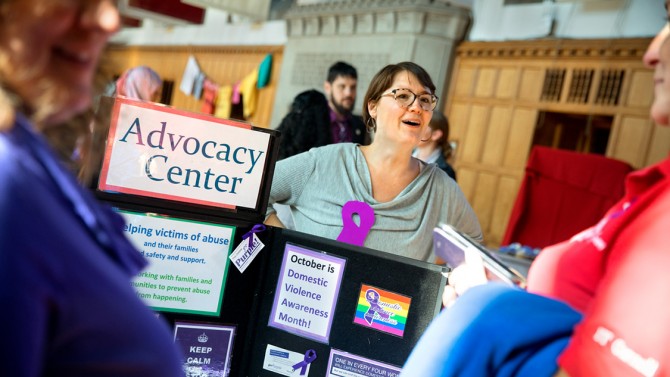Gathering highlights resources for domestic violence survivors
By Nancy Doolittle
Timed to occur during National Domestic Violence Awareness Month, Cornell’s first community gathering to take a stand against domestic violence was held Oct. 19 in Willard Straight Hall. For those unable to attend, 11 awareness tables were set up at locations across campus.
The gathering also highlighted the 40th anniversary of the Advocacy Center of Tompkins County, originally called the Task Force for Battered Women.
“The Advocacy Center has a long history of supporting people in deeply personal ways,” said Mary Opperman, vice president and Cornell’s chief human resources officer, who thanked Kristi Taylor, education director for the center, and Heather Campbell, the center’s executive director, for working with Cornell to increase campus awareness of domestic violence, help customize a “Domestic Violence at the Workplace” guide and train nearly 100 Cornell’s human resources professionals.
Opperman presented Taylor with a plaque that recognized the center “for their tireless support of victims and their partnership with the institution on awareness and prevention.”
Opperman’s remarks were followed by three survivor stories shared by Cornell community members. Their experiences were narrated by volunteers from the Women’s Resource Center, Faculty and Staff Assistance Program, and Graduate and Professional Student Assembly to protect the survivors’ identities. One staff survivor had been abused and threatened with weapons by her husband for years – she found legal support through the Task Force for Battered Women. Another survivor escaped her husband who attempted twice to kill her. She encouraged victims to seek help and support. The third, a graduate student, had experienced and lived in fear of her father’s violence while she was growing up and spoke about how this violence impacted her experience as a high-performing Cornell student.
Michelle Artibee, Cornell associate director of Work/Life, said the HR website offers a list of on-and off-campus resources to help those dealing with domestic violence. She also thanked Cornell Law School professor Elizabeth Brundige – founder and executive director of Cornell’s Global Gender Justice Clinic – for her work with Human Resources this past year.
About 30 representatives from Cornell and the local community were present to talk with attendees and network.
Cornell Dining donated cookies, cupcakes, apples and cider to help raise money for the Emergency Cornellians Aiding and Responding to Employees (CARE) Fund. The Emergency CARE Fund offers financial assistance to faculty and staff who have experienced a non-recurring sudden or emergency-related financial hardship, including funding for temporary shelter and supplies for victims of domestic violence.
To request workplace training or resource materials, contact Work/Life in Human Resources at worklife@cornell.edu.
Media Contact
Get Cornell news delivered right to your inbox.
Subscribe
